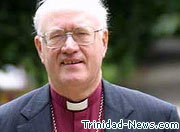The former Archbishop of Canterbury has said that he supports controversial techniques to create three and four-parent babies, dismissing the wide array of ethical and scientific concerns.
Attacking the official Church of England position as one for “flat earthers”, Lord Carey described the two techniques as the result of “amazing” research.
MPs have backed the use of Maternal Spindle Transfer and Pro-Nuclear Transfer, despite research into both techniques involving the destruction of embryos.
Not treatment
The stated aim of the procedures is to create children free from mitochondrial disease, they will not help those who already have the condition.
Writing in The Mail on Sunday, Lord Carey likened the techniques to an organ transplant.
But Dr Calum MacKellar, of the Scottish Council on Human Bioethics, said the techniques are “not a treatment”.
International opposition
He described them as “a kind of genetic cleansing procedure in which persons with disability and sickness are seen as being unworthy of life”.
A group of Italian politicians has recently challenged the Government’s stance on GM babies.
In a letter to The Times, the 55 Deputies pleaded with their British counterparts not to allow the techniques.
Profoundly alarmed
The letter argues that the creation of three-parent embryos could have “uncontrollable and unforeseeable consequences, affecting future generations, and modifying genetic heritage in an irreversible way”.
It continues, “we are profoundly alarmed and ask your parliamentarians to reflect again on the possible consequence of such an important decision, which does not concern just the citizens of your country, but the genetic patrimony of future generations”.
Last month, after a debate lasting just 90 minutes, MPs in the House of Commons voted 382 to 128 in favour of regulations allowing GM babies.
Careful consideration needed
The matter will now be voted on in the House of Lords, where former cabinet minister John Gummer, now Lord Deben, has already put forward a motion against the regulations.
It calls for the Government “not to lay new draft regulations until a joint committee of both Houses has been established and reported on” the safety of the procedures, their compliance with European law, and the definitions used in the draft regulations.

